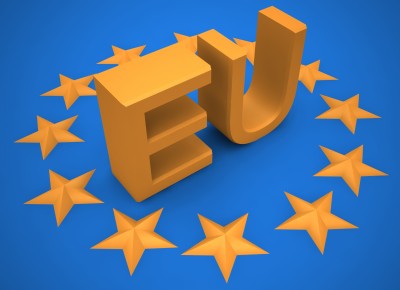Why the difference?
The European Union, because it is so large and consists of so many characteristics of a typical state, is often mistakenly referred to as a state or a country.
Go back to the Introduction section, and review how the EU is or is not similar to a state.
The EU is a political system, but it is not a state.

So what is a political system?
According to the Merriam-Webster Dictionary, it is “the members of a social organization who is in power.” (Source: Merriam-Webster Dictionary, 2004)
A bit vague, isn’t it?
Let’s define the term more clearly (Print the Political System Worksheet to record your findings in this activity).
| There are four main elements of a democratic political system, such as the European Union. These four main elements are: | ||
| 1 | A clearly-defined set of institutions that make decisions and rules together, concerning the relations between and within these institutions. | The European Union has these institutions! Go to the Europa Portal | FR, and write down the names of three institutions. We will learn about some of these institutions later. |
| 2 | Citizens and social groups make their political demands through interest groups and political parties. | There are many interest groups and political parties within the European Union. Here is an alphabetical listing of interest groups in Europe. Now answer question #2 on your worksheet. |
| 3 | Collective decisions made within the political system have an impact on society across the entire system. | In other words, decisions made by the EU affect daily life for people living in the EU. One example is EU decisions on food safety | FR. Click on the link to learn more, then answer question #3 on your worksheet. |
| 4 | There is continuous interaction between the decisions of the political system, new demands on the system, and new decisions. | Decisions made by the EU affect people’s lives, and these effects on people’s lives encourage them to pressure the system for other changes, so the system has to constantly make new decisions to keep up with people’s demands. Check out Your Voice in Europe | FR to see how people in the European Union can voice their opinions. Now, answer question #4. |
But, how is this different from what a STATE does?
The big difference is that the European Union does not have the power of coercion through police and security forces. This power still belongs to the individual member states. In other words, the EU relies on its member states to enforce the regulations and policies made by the EU. In this way, the European Union is much more decentralized than a typical state: instead of having all power concentrated on one single authority, power in the EU is spread to other parties, such as the individual nation states.
Now you are ready to move on to the other lessons in this unit. You can start with any of the three units.
(Source: Simon Hix. The Political System of the European Union. New York: St. Martin’s Press, 1999. Available at Carleton University Library.)